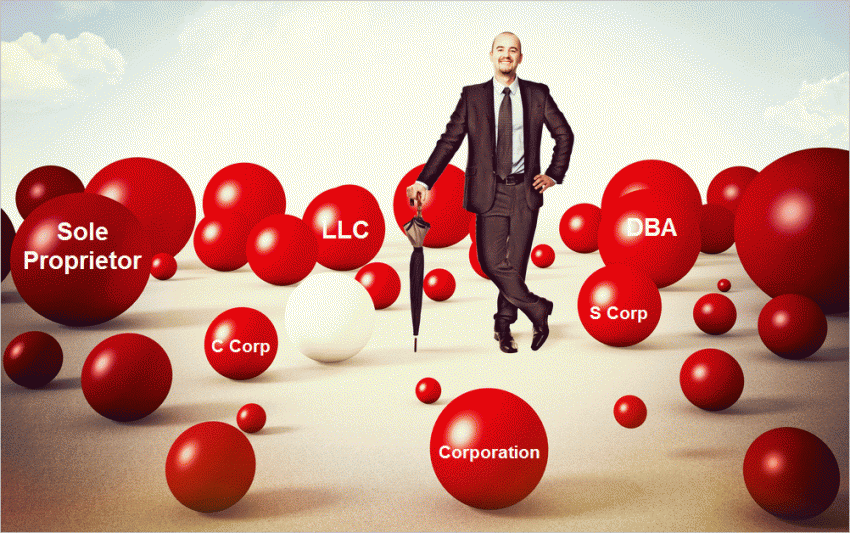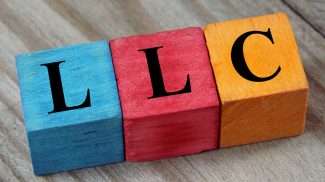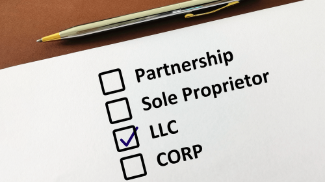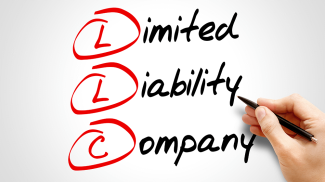When you’re starting or running a small business, countless questions arise, particularly surrounding your business’ legal structure:
- Is my business legal?
- What kind of business structure means I’ll pay the least in taxes?
- What happens if my business gets sued?
- What business structure is best for me?
Below is an introduction to some of the most common business structures to help you navigate this important decision.
Common Business Structures
The Sole Proprietorship
The sole proprietorship is the simplest way to operate a business. If you’re self-employed or conducting any kind of business and haven’t picked a formal business structure, then by default, you’re operating as a sole proprietor.
The biggest advantage of the sole proprietorship is that it’s simple to form and maintain. Since there’s no separation between the sole proprietorship and the owner, any income earned by the business is considered income earned by the owner. A sole proprietor owner just needs to keep track of all the business’ income and expenses and report it on a Schedule C with their personal tax return.
However, the biggest drawback of the sole proprietorship is that the owner is personally liable for any debts of the business. So if your sole proprietorship business runs into financial trouble, creditors can come after your personal property and savings. Likewise, you’ll be personally liable for any lawsuits brought against the business.
The DBA (Doing Business As)
A DBA (also called a fictitious business name, assumed business name, or trade name) isn’t actually a legal structure. Rather it’s a way for sole proprietors to use a business name without having to create a formal legal entity (i.e. corporation or LLC). This is typically the simplest and least expensive way for a small business to legally conduct business under a different name.
For example, if Jane Doe wants to open a sole proprietor floral business called “Petals by Jane,” she needs to file a DBA for “Petals by Jane.” This is basically so there’s a public record to let everyone know what individual(s) are behind a business.
The Corporation (C Corp)
A corporation is considered a separate entity from its owners. This means that the corporation (and not the owners) is responsible for any of its debts and liabilities. This is often called the “corporate shield” as it protects the owner’s personal assets from the business.
A corporation has a formal structure consisting of shareholders, directors, officers and employees. Every corporation must select at least one person to serve on its board of directors and officers are required to manage the day-to-day activities of the company. Corporations need to vote on important company issues. For this reason, the corporation is often seen as administrative overkill for the average small business, and is a better option for bigger companies who plan to go public, seek VC (venture capital) funding, or invest profits back into the company.
As a separate business entity, a corporation files its own tax returns. As a C Corporation owner, you’ll need to file both a personal tax return and a business tax return. In some cases, this can result in a “double taxation” burden for small businesses where first the business must pay taxes on its profits, and then the owners/shareholders must pay taxes on an individual level when those profits are distributed to them.
S Corporation
An S Corporation is a corporation that’s been designed to address this double taxation issue. An S Corporation does not file its own taxes. Rather, company profits are “passed through” and reported on the personal income tax return of the shareholders. S Corporation owners are taxed on their respective shares of the company’s profits (and these profits are not subject to self-employment tax). If an S Corporation owner works in the business, they must be paid a reasonable wage for their activities and the S Corporation must pay payroll taxes on these wages.
An S Corporation starts out like a C Corporation; then the owners elect ‘S Corporation Status’ by filing Form 2553 with the IRS in a timely manner. However, be aware that not every business can qualify to be an S Corporation. For example, an S Corporation cannot have more than 100 shareholders and shareholders must be U.S. citizens or residents.
The LLC (Limited Liability Company)
An LLC is a hybrid of a sole proprietorship and corporation. This structure is very popular among small businesses, and for good reason. The LLC limits the personal liability of the owners, but doesn’t require much of the heavy formality and paperwork of the corporation. This makes it a great choice for business owners that want liability protection, but don’t want to deal with exhaustive meeting minutes, addendum filings, or other paperwork you’d need to file as a corporation.
The LLC gives you flexibility to choose how you want to be taxed. For example, you can structure your LLC to be taxed as a C Corporation or more commonly as an S Corporation (where the business doesn’t file its own taxes).
Keep in mind that this summary isn’t an exhaustive outline of all the nuances of the various business structures. Rather, it’s an introduction to the major differences to help you start to determine what’s right for your business.
Do your own research, and possibly speak with an accountant about your specific tax situation.
Difference Concept Photo via Shutterstock








Nellie, great overview of the possibilities. Readers should also note that there is much more to all of this as you aptly point out. For example, DBAs offer no protection against someone taking your name and incorporating it. Also, fringe benefits, insurances and the like are treated differently depending on the entity. No one should form an entity on their own. A tax attorney should be consulted to avoid mistakes and complicated do-overs. Readers may want to look at Choice Of Legal Entity For Your Business at http://www.sjfpc.com/choice_of_legal_entity.html and Choice of Business Entity: Legal, Financial and Other Non-Tax Concerns http://www.sjfpc.com/choice_business_entity_legal_financial_non-tax_concerns.html
Also, some states like PA have a capital stock tax. Choosing the wrong entity can result in some very significant state taxes.
Hi Steven –
Thank you very much for reading and commenting on my post! Appreciate your insight and additional advice!
-Nellie
Jennifer D.
We operated as a Sole Proprietorship. One of the reasons we incorporated was the liability issue. But the main selling point for us was we could have a minority-owned status – which made ME the boss. 🙂
Hi Jennifer!
Love it! So true! Thanks so much for reading and commenting on my post! Best of luck to you and your business!!
-Nellie
Aira Bongco
There is a lot to learn from this article. DBA is quite new to me. I always thought it was just sole proprietorship, partnership and corporation. It’s amazing how many variations people can come up with.
Hi Aira –
Very true! The DBA is the filing required for the sole proprietorship business structure; the DBA is not a business entity but merely the filing paper required to formalize a sole prop within the state or county you conduct business in. it is basically a filing you do with your state or county giving notice to the public as to the business name you are conducting your business under as a business owner.
Thanks for reading and commenting!
– Nellie
As far as DBA, they offer no protection or exclusivity as to the business name. So if you merely do a DBA and your business name generates goodwill and name recognition, someone could incorporate the name for themselves. So please be careful before using this operational form.
Great info, Nellie.
Back to the basics…and for some new small business owners, learning about business entities can be a real wake-up call.
Setting a business up correctly is crucial.
The Franchise King®
Thank you so much Joel!!! 🙂
My business partner started out as sole proprietorship for the sports surfacing business locally and then branched to Limited Liability Company (LLC) when I came in. Informative article.
Hi Diana –
Good to hear that your business partner branched into an LLC! Best of luck to you in your business journey and I am glad to hear you found my article helpful!
-Nellie
Bobbi Johnson
This is a great summary of the various business structures. I just want to add that while S Corps do not pay taxes on the corporate level (nor do LLC’s on the business level), they do still have to file a tax return separate from their personal return with the IRS and there may be returns required by their respective state. I know here in PA, returns are required for all C Corps, S Corps and LLC’s (even a sole proprietor LLC).
Thanks so much for the comment and response Bobbi!
Good overview. In Ohio it is good to form a seperate entity (LLC or Corp) for four reasons; 1. Asset protection, name registration, seperate finances, and market creditability.
Yes, very true. Thank you for the input Jim!
Martin Lindeskog
Nellie: I hadn’t heard about “Doing Business As”. Have you heard about the company form, business employment company?
Hi Martin –
Doing Business as is just another name for doing business under a fake business name as a single person business owner or sole prop and the filing required to formalize a sole prop is a doing business as filing also know as a DBA with the state or county you conduct business in. I have not heard of that company you are referring to.
Thanks!
-Nellie
Kendall Hudson
Thank you for putting this into easy to understand language. I’ve read a lot of books and articles on this subject and felt like I understood it, but your explanation really made me comfortable with the information.
Hi Kendall – not a problem! I’m so happy to hear my post helped and answered your questions! 🙂 Best of luck to you and your venture! – Nellie
Melissa
Hi – great information. Thank you!
Does a Partnership fall into one of these or is it something different entirely?
Hi Melissa –
Glad the post was helpful! 🙂 Thanks for reading!
In response to your Q: A partnership is two or more people doing business together…very similar to the sole prop, but you are dealing with a partners so whatever you do or they do, you are all joined at the hip and any actions on their part or any part of any partner can bind you personally and legally. As such, if you are going to be in business with a partner, the structure you may want to consider is the Limited Liability Company which not only allows a co to be taxed as a partnership but will also provide you with the liability protection as well. You can read more about the LLC here at: http://www.corpnet.com/benefits-of-the-llc/
Hope that helps!
-Nellie
Janice Hansen
What is the best structure for a small business, so I can use the tax credits on my personal Income tax, or is this a possibility. Thanks for your help
Hi Janice,
Thank you for your comment! Generally we see that small businesses prefer the LLC structure. The LLC is a pass-through tax status, meaning that the company’s profits and losses pass through to the individual owners’ tax returns. The LLC is also attractive to small business owners because it avoids many of the formalities that corporations must face. Hope this helps!
-Nellie
If you are a one person LLC it is a disregarded entity. As a result you report all its income on your Schedule C on your individual Form 1040.
ciera
so are LLC”s only good if it is more then 1 person or is an LLC a good option for a business being ran by 1 person??
Hi Ciera,
An LLC can absolutely operate with only 1 member. It’s referred to as a single-member LLC, and it’s very common!
Ciera: To learn more on this topic please read Disregarded Entities at http://www.sjfpc.com/disregarded_entity.html
Easy ABN
In some places, having a Corporation or LLC is good for several factors like protecting assets, increasing profit, and registering your business. Here in Australia, we have an online ABN registration. People opting to register their businesses here will save a lot of time.
Reza
Hi! I am thinking about starting up a business. I would be doing personal shopping for individuals who simply do not have the time (busy lifestyle). How would you recommend me going about it?
Hi Reza,
Thank you for your question! Ultimately, the way you structure your business is your decision, however, what we see most often is that smaller based businesses that only have one or two owners typically prefer the LLC. The LLC offers liability protection, just like a corporation, but it avoids several formalities that corporations face. For example, corporations are required to have regular meetings, stock, shareholders, etc. LLCs tend to be a little simpler, as they do not have these requirement. Hope that helps!
If you’d like to chat further, feel free to call my company and ask for Katie Hendrix and she would love to walk you through some options: 888.752.0363
-Nellie
lazara
Where can i contact you guys to get a bit more info. Im starting a cleaning service and im still confused. thnx
Hi Lazara –
Feel free to contact Katie Hendrix who can help answer your questions. You can reach her via email at: [email protected] or phone at 805.449.2638 x110.
Thanks!
-Nellie
Wendy S.
Hi! I recently formed my business at our local gov office. I wanted to know what the difference was between a “sole proprietorship” and “proprietorship”.
Thanks!
Wendy, sole proprietorship relates to a one person operation, non-incorporated. Proprietorship is more generic as it can include both a sole proprietorship and a business generally. You do realize that neither of these offer any legal protection against being sued personally for business debts.
Kermesha
I am so glad I ran into this article. I am new to the entrepreneurship world. I need help determining how to move forward with my business name. It is a little complicated. could you please email me I could really use some help.
Thanks
Hi Kermesha –
Glad the article was helpful for you. I have tons of information on registering your business name. Can you please send me your email and I will have someone from my team touch base for a free business consultation to chat about your specific needs?
Alternatively, you can touch base directly with Katie Hendrix anytime and she would love to walk you through next steps: [email protected]; 805.449.2638 x110
Thank you!
-Nellie
Annette
Quick Question? As a Social Security recipient, I also work via contract as a consultant teaching courses at various colleges. However, since the colleges continue to send me W-2 earnings, SS shows I have now received an overpayment from the amounts I should otherwise earn. If I set up an LLC, will my contractors send me a 1099 instead or what are your suggestions for showing on my 1040 that I am in fact operating a business and am not a part-time worker??
Hi Annette,
Great question. As this is a tax question, I would recommend getting some guidance from a CPA or accountant. They will be able to present you with your options and should point you in the right direction.
Sorry I couldn’t be of more help!
-Nellie
Marjorie Banks
Hello Annette, How are you doing today?
I filled for a DBA as sole proprietorship recommended by my Secretary of State office. If I am understanding what is being said I need to file for LLC also. Is that going to be a challenge because I filed DBA first. I’m wondering why I was advised to file DBA as sole proprietorship first if I should have done LLC first. I know that this is a huge leaning curve for me but I really want to do it correct. I have a EIN number and have paid taxes to my city, county and state for a few months now. It sounds like I need to file for a LLC also. Do I just go back to my Secretary of State office and file or is this going to be a big issue at this point. Please advise…..I really need and want to do this right. Also, will there be a fine or just a fee to add LLC for my business. Thanks for sharing your knowledge to those of us that are still working on our learning curve.
Hello,
I’m looking to start up my own Quarterback training academy. I’ll be training athletes in speed and agility but my main focus will be training quarterbacks specific. I’m currently using CoachUp.com to grow my clientele but now I feel comfortable of having enough clients to start my own academy. I’m not sure on which direction to go with as far as starting a DBA or LLC. I have clients pay with cash, check or credit card made out to me and would have to have those payments made to my academy. I also purchase a lot of equipment for training and using different facilities as well as work from home. I would like to be able to write off those expenses at the end of the year. I will have my clients sign a waiver that will cover my insurance liabilities. I have friends that have done both, started a DBA and LLC. Any suggestions before I click the submit button? Thanks
Hi Raymond:
Thank you for your inquiry and congrats to starting your own business venture. In response to your inquiry: one can go either route. It’s important to note that starting as a sole prop via filing a business as a DBA will not give one any asset or liability protection. Alternatively, the LLC route will register a business, give one the asset and liability protection and peace of mind that one needs in running a business along with added credibility and sometimes tax savings. Often times we see that clients are more apt to wanting to do business with a company that has taken the necessary steps to establish themselves as a corp or an LLC because they view that company as more established and legit especially in the fitness industry. Feel free to reach out with any other questions.